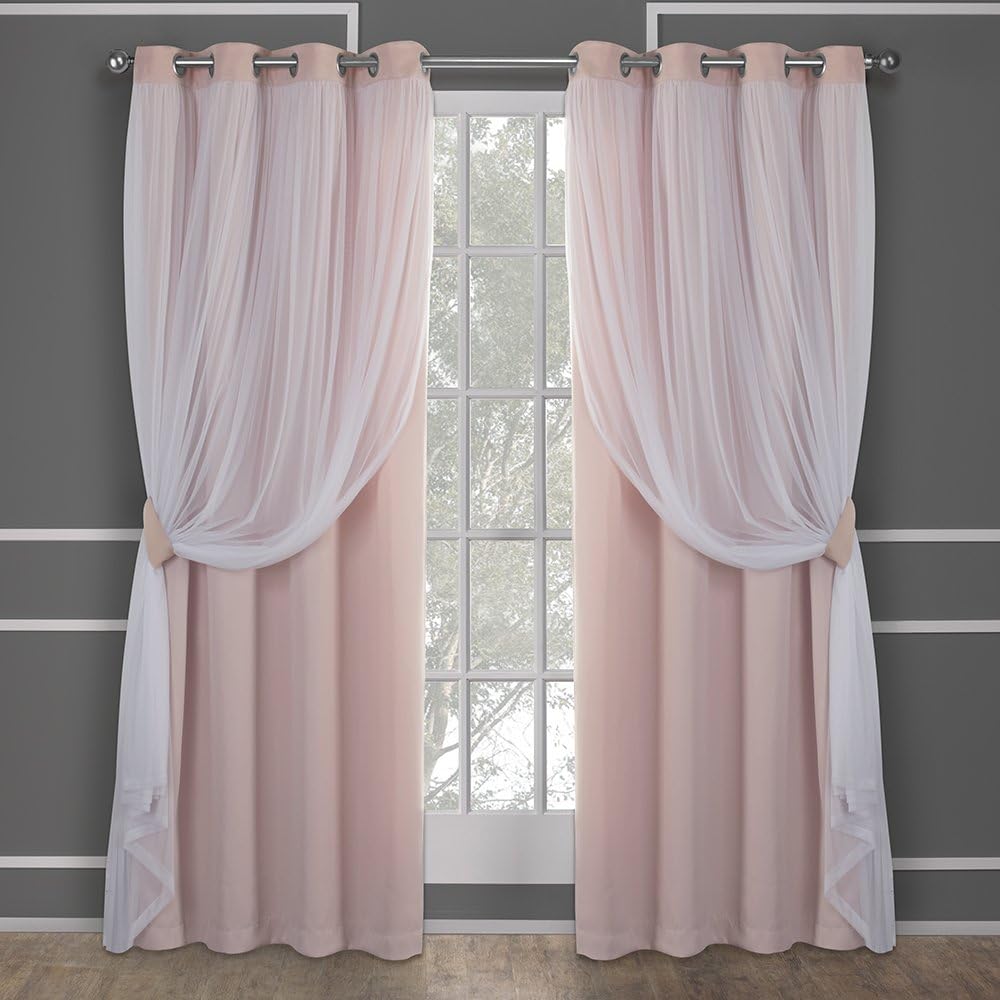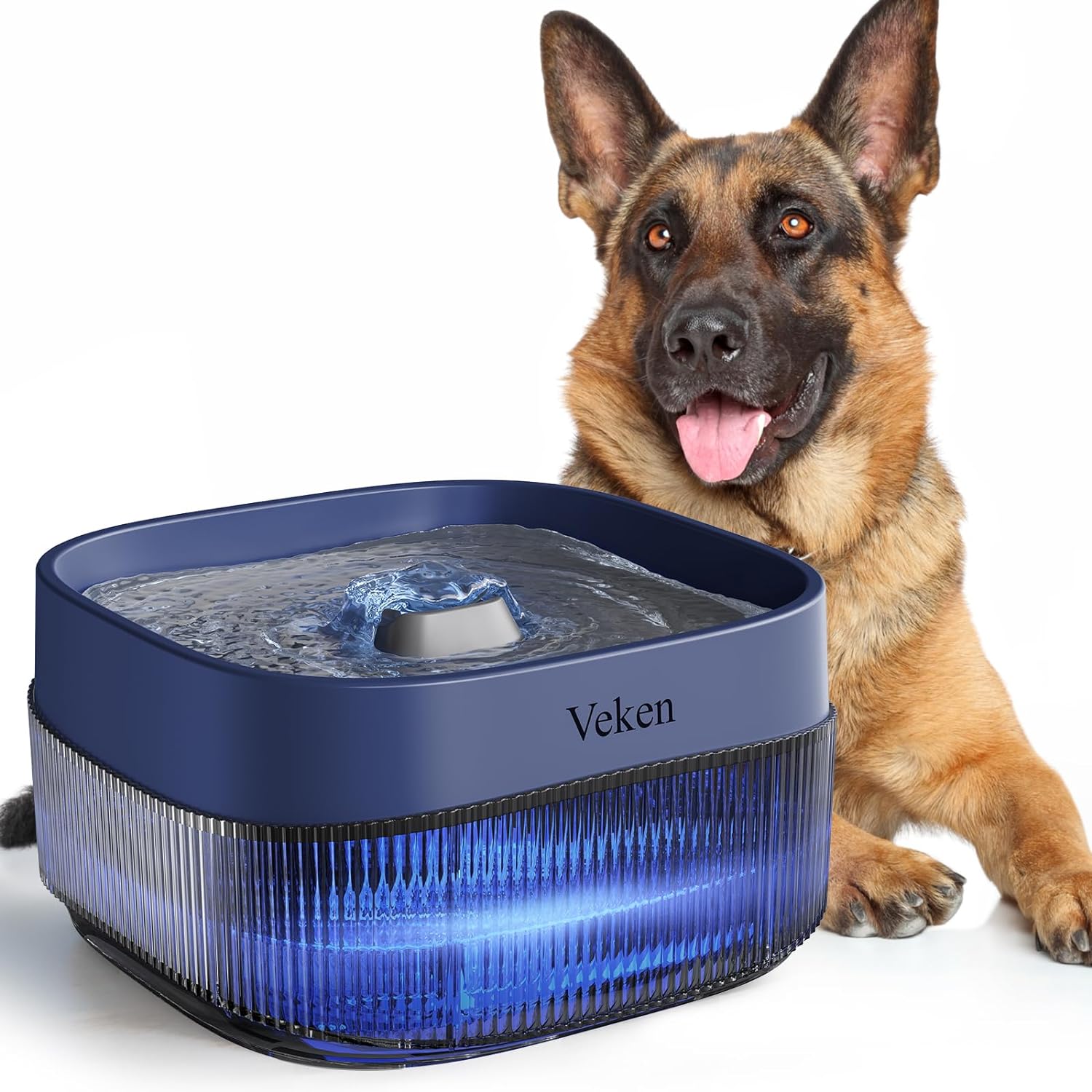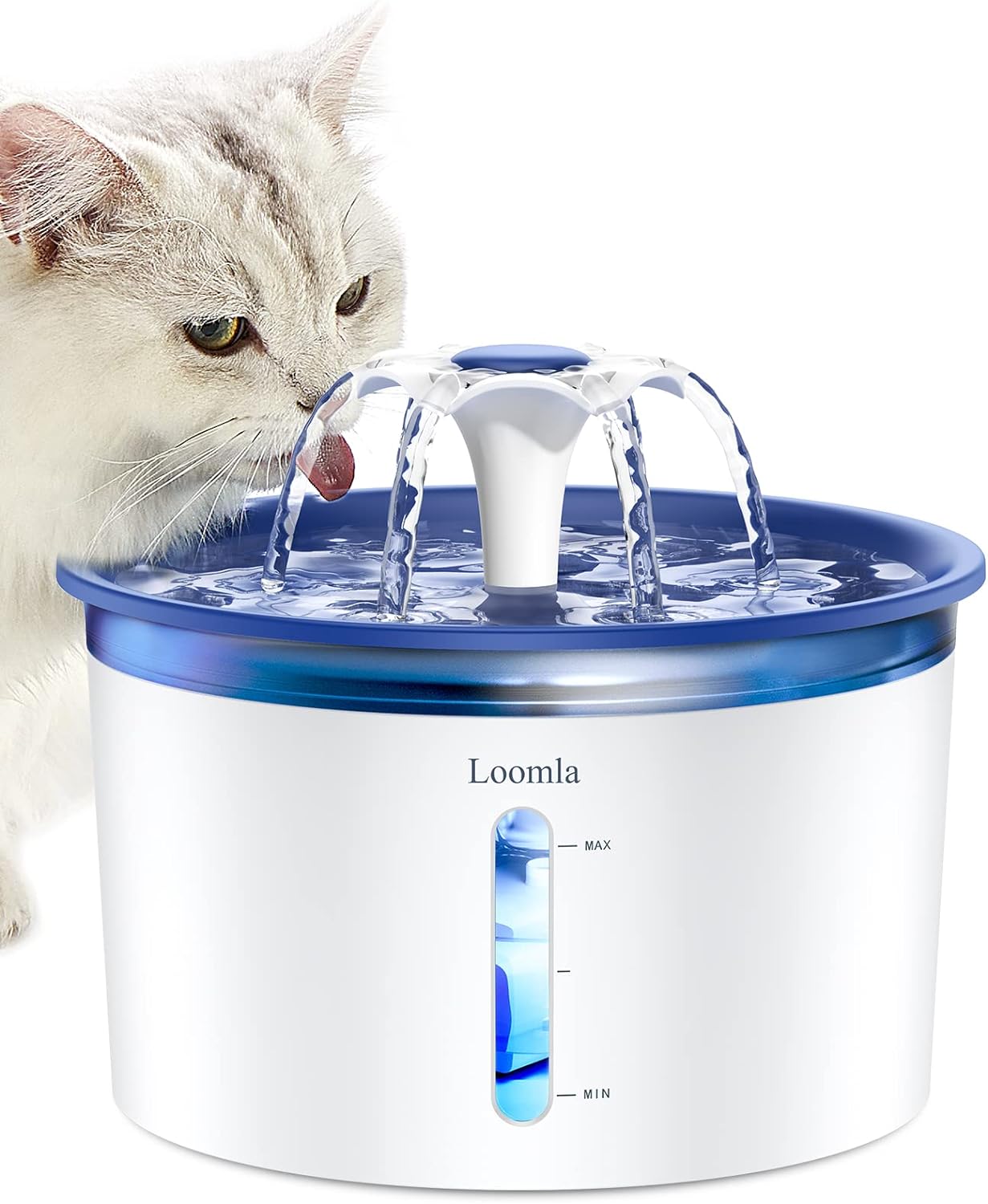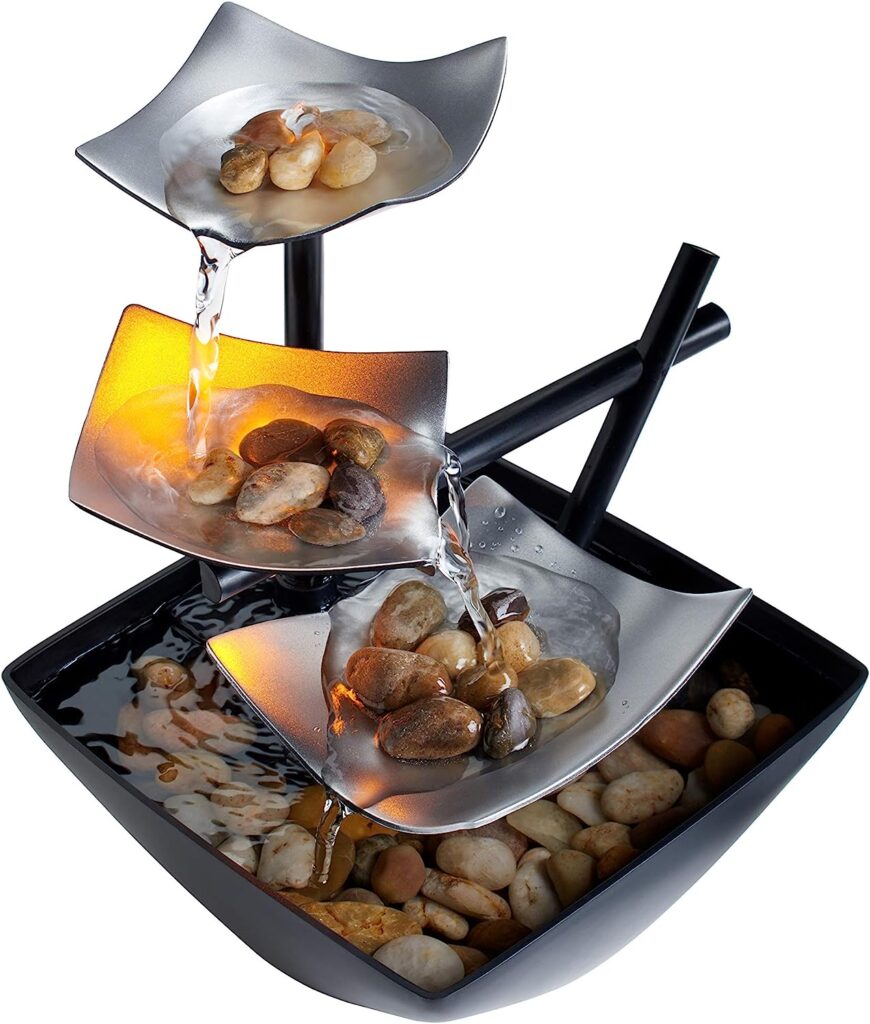
Check Price Water Fountain
Water fountains for home: hold a special place in human history, symbolizing both practicality and artistry. Dating back to ancient civilizations such as Mesopotamia and Egypt, where they were used for irrigation and decorative purposes, water fountains have evolved into diverse forms and styles over the centuries. Today, they grace gardens, public squares, and interior spaces, offering visual appeal and a sense of tranquility.
Importance of water fountains
Historical significance
Modern-day relevance
Types of Water Fountains For Home
Wall-mounted fountains
Freestanding fountains
Garden fountains
Tabletop fountains
Benefits of Water Fountain For Home
Aesthetic appeal
Stress reduction
Air purification
Relaxation and tranquility
Factors to Consider When Choosing a Water Fountain For Home
Size and space
Material
Style and design
Maintenance requirements
Installing a
Water Fountain For Home
Location selection
Water source and drainage
Electrical requirements
Assembly and setup
Maintenance Tips for Water Fountains For Home
Cleaning schedule
Water quality management
Pump maintenance
Winter care
Incorporating
Water Fountain For Home
in Different Settings
Residential spaces
Commercial establishments
Public parks and gardens
Meditation and wellness centers
DIY Water Fountain Projects
Simple tabletop fountains
Recycled material fountains
Miniature garden fountains
Creative designs for customization
Environmental Impact of Water Fountains
Water conservation measures
Energy consumption
Eco-friendly fountain options
The Future of Water Fountain Design
Sustainable innovations
Technological integration
Artistic collaborations
Case Studies: Iconic Water Fountains For Home Around the World
Trevi Fountain, Rome
Bellagio Fountains, Las Vegas
Buckingham Fountain, Chicago
Dubai Fountain, Dubai
Water Fountain Trends in Interior Design
Minimalist designs
Smart fountain features
Integration with indoor plants
Incorporating water features into furniture
Health Benefits of Water Fountains
Humidifying indoor spaces
Soothing sound for relaxation
Stimulating creativity and productivity
Alleviating symptoms of allergies and asthma
Cultural and Spiritual Significance of Water Fountains
Symbolism in various cultures
Rituals and ceremonies
Zen and Feng Shui principles
Conclusion
Summarize the importance and versatility of water fountains
Water Fountains: Enhancing Spaces with Elegance and Tranquility
Water fountains have been enchanting people for centuries, captivating with their beauty and soothing sounds. From ancient civilizations to modern urban landscapes, these timeless creations continue to add a touch of elegance and serenity to various settings. In this article, we explore the fascinating world of water fountains, from their types and benefits to installation tips and cultural significance.
Types of Water Fountains
water fountain for home, come in a variety of styles, each suited to different settings and preferences. Wall-mounted fountains add elegance to indoor spaces, while freestanding fountains create focal points in gardens and courtyards. Tabletop fountains are perfect for smaller areas, bringing the soothing sound of flowing water to desks and countertops. Garden fountains, with their larger size and intricate designs, enhance outdoor landscapes with their beauty and charm.
Benefits of Water Fountains
Beyond their aesthetic appeal, water fountains offer numerous benefits for both physical and mental well-being. The sight and sound of flowing water have a calming effect, reducing stress and promoting relaxation. Additionally, water fountains help purify the air by releasing negative ions, which can improve overall air quality. Whether indoors or outdoors, these tranquil features create a serene atmosphere that promotes a sense of peace and tranquility.
Factors to Consider When Choosing a Water Fountain
When selecting a water fountain for your space, several factors should be taken into account. Consider the size and layout of the area where the fountain will be placed, as well as the style and design that best complements your aesthetic preferences. Materials such as stone, metal, and resin offer durability and visual appeal, while maintenance requirements vary depending on the fountain type. By carefully considering these factors, you can choose a fountain that enhances your space and fits your lifestyle.
Installing a Water Fountain
Proper installation is essential for the functionality and longevity of a water fountain. Begin by selecting a suitable location that provides adequate space and complements the overall design of your space. Ensure access to a water source and proper drainage, as well as electrical outlets if the fountain requires power. Follow manufacturer instructions for assembly and setup, and consider hiring a professional for complex installations to ensure optimal performance.
Maintenance Tips for Water Fountains
Regular maintenance is key to keeping your water fountain running smoothly and looking its best. Develop a cleaning schedule to remove debris and prevent algae growth, and use water treatments to maintain water quality. Inspect and clean the pump regularly to ensure proper functioning, and consider winterizing outdoor fountains to protect them from freezing temperatures. By taking care of your fountain, you can enjoy its beauty and benefits for years to come.
Incorporating Water Fountains in Different Settings
Water fountains are versatile additions to various settings, enhancing both indoor and outdoor spaces with their beauty and tranquility. In residential settings, they create focal points in gardens and patios, while in commercial establishments, they add sophistication to lobbies and outdoor seating areas. Public parks and gardens benefit from the calming presence of water features, providing visitors with a peaceful retreat from the hustle and bustle of city life. Meditation and wellness centers incorporate water fountains into their design to create serene environments that promote relaxation and mindfulness.
DIY Water Fountain Projects
For those who enjoy hands-on projects, DIY water fountain projects offer a creative outlet for expressing your style and personality. Simple tabletop fountains can be made using basic materials such as ceramic pots and pebbles, while recycled materials such as old tires and wine barrels can be repurposed to create unique outdoor fountains. Miniature garden fountains add charm to outdoor spaces, while creative designs allow for customization to fit any aesthetic.
Environmental Impact of Water Fountains For Home
While water fountains provide numerous benefits, it’s essential to consider their environmental impact. Implementing water conservation measures such as using recycled water and installing water-saving devices can help minimize water usage. Additionally, choosing energy-efficient pumps and incorporating solar-powered features can reduce energy consumption. Eco-friendly fountain options, such as those made from sustainable materials or designed to support local wildlife, offer environmentally responsible alternatives for conscious consumers.
The Future of Water Fountain Design
As technology continues to advance, the future of water fountain design holds exciting possibilities. Innovations in sustainable materials and energy-efficient technologies pave the way for eco-friendly fountain options that minimize environmental impact. Integration with smart technology allows for customizable features such as programmable lighting and water patterns, enhancing the visual appeal and functionality of water fountains. Collaborations between artists and designers push the boundaries of traditional fountain design, creating innovative and immersive experiences that engage the senses and inspire awe.
Case Studies: Iconic Water Fountains Around the World
Several iconic water fountains captivate visitors with their beauty and grandeur. The Trevi Fountain in Rome, with its Baroque-inspired design and mythological sculptures, attracts millions of tourists each year. The Bellagio Fountains in Las Vegas dazzle audiences with their synchronized water and light shows set to music. In Chicago, the Buckingham Fountain serves as a stunning centerpiece in Grant Park, while the Dubai Fountain in the UAE amazes spectators with its record-breaking choreographed performances. These iconic landmarks showcase the diversity and artistry of water fountain design, inspiring awe and admiration in all who behold them.
Water Fountain Trends in Interior Design
In interior design, water fountains are experiencing a resurgence in popularity, as homeowners seek to create tranquil retreats within their homes. Minimalist designs with clean lines and simple forms complement modern decor styles, while smart fountain features offer convenience and customization options. Integrating water features with indoor plants creates harmonious indoor environments that promote health and well-being. Designers are also incorporating water features into furniture pieces such as coffee tables and room dividers, blurring the lines between art and function.
Health Benefits of Water Fountains
The health benefits of water fountains extend beyond their aesthetic appeal, offering tangible improvements to both physical and mental well-being. The humidifying effect of flowing water helps maintain optimal indoor humidity levels, which can alleviate symptoms of dry skin and respiratory issues. The soothing sound of running water has been shown to reduce stress and anxiety, promoting relaxation and improved sleep quality. In creative and work environments, water fountains stimulate creativity and productivity, creating a conducive atmosphere for inspiration and innovation. Additionally, the negative ions released by water fountains have been linked to improvements in mood and overall well-being, making them valuable additions to any space.
Conclusion
Water fountains are more than just decorative features – they are timeless symbols of beauty, tranquility, and vitality. Whether gracing a garden, adorning a public square, or enhancing an indoor space, water fountains captivate the senses and elevate the ambiance with their elegant presence. From ancient civilizations to modern-day marvels, these enchanting creations continue to inspire awe and wonder, enriching our lives with their timeless allure.
FAQs
Are water fountains suitable for indoor use?
Yes, many water fountains are designed specifically for indoor use and can enhance any living space with their soothing presence.
How difficult is it to install a water fountain?
The difficulty of installation depends on the type and size of the fountain. Simple tabletop fountains are easy to set up, while larger outdoor fountains may require professional installation.
Do water fountains require a lot of maintenance?
While water fountains do require regular maintenance to keep them clean and functioning properly, the level of maintenance varies depending on factors such as size, location, and design.
Can water fountains help improve air quality?
Yes, water fountains release negative ions into the air, which can help purify and freshen indoor spaces by neutralizing pollutants and allergens.
What are some eco-friendly options for water fountains?
Eco-friendly water fountain options include using recycled materials, choosing energy-efficient pumps, and incorporating solar-powered features to minimize environmental impact.
For individuals who enjoy hands-on projects, DIY water fountain projects offer a creative outlet for expressing personal style and preferences. These projects can range from simple tabletop fountains to elaborate garden installations, allowing DIY enthusiasts to customize their water features to fit any space and budget.
Simple Tabletop Fountains:
Creating a tabletop fountain is a straightforward project that requires minimal materials and tools. Start with a waterproof container such as a ceramic pot or bowl, and add a small submersible pump. Arrange decorative stones or pebbles around the pump to conceal it and create a natural-looking base. Then, add water to the container and plug in the pump to enjoy the soothing sound of flowing water.
Recycled Material Fountains:
For eco-conscious DIYers, recycled material fountains offer a sustainable and budget-friendly option. Old tires, wine barrels, and even salvaged metal can be repurposed to create unique water features with rustic charm. Get creative with materials and design elements to transform everyday objects into functional works of art that add character to any outdoor space.
Miniature Garden Fountains:
Miniature garden fountains are perfect for adding a touch of whimsy to small outdoor spaces such as balconies or patios. Begin by selecting a decorative container or planter, and add a small fountain pump and tubing. Arrange miniature plants, rocks, and figurines around the fountain to create a charming scene reminiscent of a tranquil garden oasis. These pint-sized fountains are easy to maintain and provide a delightful focal point for outdoor entertaining.
Creative Designs for Customization:
For those with a flair for design, the possibilities for customizing water fountain for home, are endless. Experiment with different materials such as glass, copper, or mosaic tiles to create one-of-a-kind designs that reflect personal style and preferences. Incorporate elements such as LED lighting, water jets, or kinetic sculptures to add visual interest and enhance the overall aesthetic appeal. Whether whimsical or sophisticated, custom-designed water fountains are sure to impress and delight both homeowners and guests alike.
Environmental Impact of Water Fountains
While water fountain for home, offer numerous benefits for physical and mental well-being, it’s essential to consider their environmental impact. Implementing eco-friendly practices and choosing sustainable materials can help minimize the ecological footprint of water fountain installations.
Water Conservation Measures:
One of the primary concerns with water fountain for home, is water usage. Implementing water conservation measures such as using recycled water or rainwater harvesting can help reduce consumption and minimize waste. Additionally, incorporating water-saving features such as flow restrictors or automatic shut-off valves can help conserve water without sacrificing performance.
Energy Consumption:
Another environmental consideration is the energy consumption associated with water fountain operation. Choosing energy-efficient pumps and lighting fixtures can help reduce electricity usage and lower utility costs. Additionally, incorporating solar-powered features such as solar panels or solar-powered pumps can further minimize environmental impact by harnessing renewable energy sources.
Eco-Friendly Fountain Options:
When selecting a water fountain for home, opt for eco-friendly options made from sustainable materials such as recycled glass, reclaimed wood, or natural stone. Avoid materials that contain harmful chemicals or toxins, and choose products that are certified as environmentally friendly by reputable organizations. By choosing eco-friendly fountain options, you can enjoy the beauty and benefits of water features while minimizing your ecological footprint.
Conclusion
Water fountains are more than just decorative features – they are symbols of beauty, tranquility, and vitality that enhance any space with their elegant presence. Whether indoors or outdoors, simple or elaborate, water fountains captivate the senses and elevate the ambiance with their soothing sounds and mesmerizing designs. By incorporating water fountains into your home or garden, you can create a peaceful retreat where you can relax, recharge, and reconnect with nature. Top Trending Water Fountains for home
Get Access Now: Dog Water Fountains: Refresh Your Pup’s Routine
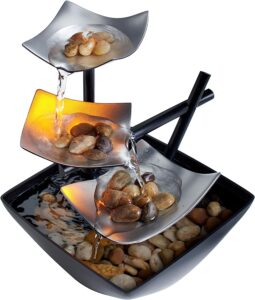
9.5
out of 10
Our Score
Pro
- Quality
- Good Effect On Eyes
- Appearance
- Relaxation”
Cons
- Service Issue in Some Places
- Water efficiency”
Customer reviews



